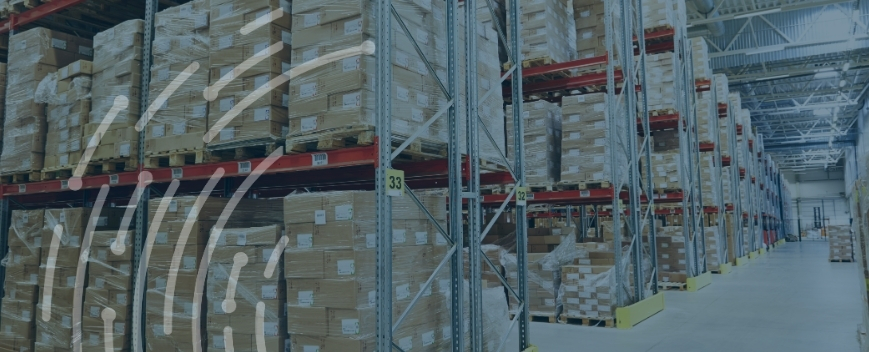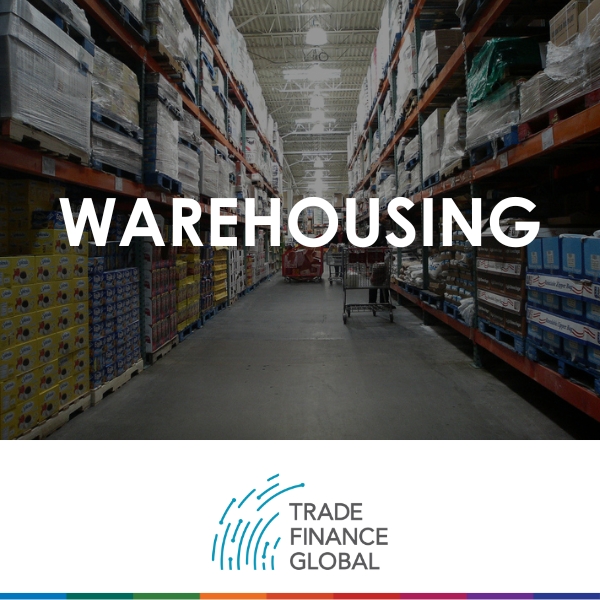What Is Warehousing?


Access trade, receivables and supply chain finance
We assist companies to access trade and receivables finance through our relationships with 270+ banks, funds and alternative finance houses.
Get startedContent
A warehouse is a commercial building, specifically used for goods storage.
Warehousing is, therefore, the act of storing goods at a paid-for location, with the intent to sell or distribute them at a later date.
Small businesses don’t necessarily pay for warehousing services because the owners use space in their garages, basement or spare rooms in their homes for storage.
Large businesses, on the other hand, rely on renting space in buildings to store their goods.
Why Warehousing Is Important
An IBISWorld UK Market Research Report in 2017 revealed that the popularity of online shopping has supported the demand for warehousing, boosting revenue for the warehousing and storage industry.
Experts estimate a strong compound annual growth rate of 11.3% over the next 5 years, through 2017-2018, ultimately making it a £21.3 billion industry.
So, why the growth and reported importance of warehousing?
Supply chains have become increasingly complex and consumers are forging new demands.
Benefits of Warehousing
Warehousing has 7 key benefits:
1. Opportunity to expand
Finding enough storage in your manufacturing facility can stifle productivity especially when stored goods get in the way of work, reducing efficiency.
Warehousing gets rid of manufactured products, creating enough space and a conducive environment to efficiently produce.
2. Production support
Black Friday, Cyber Monday, and Christmas holidays are the manufacturer’s biggest sales days annually.
This means more sales, increased production and an immense need for production support.
A warehouse ensures timely, consistent production support which can significantly reduce production lead times.
3. Product packing and processing
An efficient warehouse also offers product picking, packing and shipping services.
4. Price control
The market is all about supply and demand.
To balance your books properly, a warehouse offers a business an opportunity to directly influence supply and demand.
Goods are stored when supply exceeds demand and released once demand exceeds supply.
5. Financing
Looking for trade finance?
A warehouse offers a solution by using the goods stored as collateral to a lender.
6. Reduced business risk
Did you know that goods stored in a warehouse are insured against the warehouse owner’s risk?
This means you don’t have to worry about inventory loss by fire, theft, or damage.
You will be compensated anyway.
7. Spot stocking
Certain holiday-specific products such as Halloween, Easter, and Christmas-themed goods are seasonal, yet, a manufacturer ought to produce in large quantities to meet the demand when the time comes.
Spot stocking is important for such businesses, offering simultaneous access to warehouses in different locations, close to target markets, reducing transport time and meeting customer needs everywhere within a short period.
It is also a great option for agricultural products.
Types of Warehouses
There are 3 types of warehouses, as discussed below:
1. Private warehouses
Private warehouses are owned by individual manufacturers or producers, for storing their own goods, for example, cold storage for perishable goods such as fruits and vegetables.
The authorised warehouse keeper must not necessarily own the goods but must be the depositor.
There are 3 types of private warehouses:
- Type C, premises-based;
- Type D, premises-based where a trader has authority to release products for free circulation according to the Local Clearance Procedure (LCP); and
- Type E where authorisation for release is stricter than types C and D. Instead of the premises, the record-keeping system is authorised.
2. Public warehouses
Public warehouses are operated by a warehouse keeper, for storing goods placed under the customs warehouse procedure by other traders, who are also known as depositors.
3. Bonded warehouses
Bonded warehouses are licensed by the government to accept imported goods for storage, and goods are released only when customs duties have been paid.
They are usually at sea or dry ports in big cities and could either be privately owned or owned by dock authorities.
The name comes from the process that the warehouse should give an undertaking, otherwise known as a ‘bond’ that it will not allow the removal of goods until customs authorities give their consent.
How to find and access warehousing
Finding a warehouse that satisfies a business’s unique needs is a complicated process, which luckily, only needs consideration of certain crucial factors.
- Location – Assess location on both a regional and national basis. A cheaper location is not necessarily the cheaper option once you consider transportation costs.
- Type of building – New buildings are a new catch, but are the facilities satisfactory? Is there sufficient power, adequate temperature control, or clear height to allow for new ductwork when you need it?
- Gross rent – Most landlords will reduce their operational costs by passing on operating expenses to the depositor, adding to the net rent. Responsibilities for additional expenses such as real estate taxes, maintenance, repair charges, and management cost should be well stipulated.
- Dedicated facility, flex space or multi-client – Depending on the option offered, there will be a considerable difference in rent cost. Just make sure that the option picked doesn’t compromise the security, safety, or quality of your products.
- Opportunity for unanticipated value-added services – A warehouse only stores goods. What if you want extra services like special packaging, labelling, or repairs? Is the service provider flexible?
- Only pay for service used – Labour is a warehouse’s biggest expense and businesses need to decide whether they need cross-trained staff or temporary labour. Cross-trained staff can be borrowed when one account is slow to prevent hiring temporary labour. Temporary labour is an efficient way of handling activity spikes in a short period.
Despite the forecast growth of the warehousing and storage industry, as aforementioned, many experts predict that the UK will run out of warehousing space within a year.
Sadly, this is after accounting for the speculative building projects.
It is an issue of land availability in the UK, which will, unfortunately, increase the cost of the service.
As you think about taking advantage of warehousing, therefore, also think of innovative ways we can structure the industry and have enough space or all.
Turns out, online shopping is a double-edged sword.
Case Study

Sofa Distributor
Warehouse and receivables financing were required from TFG’s structured finance experts in order to help us grow, trade with bigger partners and take calculated risks in order to protect the balance sheet and grow steadily.
- All Topics
- Key Terms
- Incoterms Resources
- Podcasts
- Videos
- Conferences















